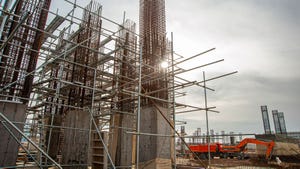Three Data Center REITs Report Solid Q1, Minimal Pandemic Impact
CoreSite, CyrusOne, and QTS had a successful leasing quarter, but the lockdowns didn’t start until late in the period.
Business was good in the first quarter for the three publicly traded data center REITs that reported earnings this week. But the quarter ended only 10 days after California became the first US state to order lockdowns – in hopes of slowing the spread of COVID-19.
Executives of CoreSite, CyrusOne, and QTS Realty were cautiously optimistic about their prospects for the rest of the year, citing uncertainty in the face of the pandemic-induced economic downturn.
All three companies reported revenue growth and stellar leasing results for the first quarter. All three also said very small portions of their recurring revenue came from customers in industries the crisis hit the hardest.
CyrusOne and QTS reported big hyperscale customer deals closed during the quarter, while CoreSite, which relies on hyperscalers for a smaller portion of revenue than its two peers do, reported a healthy volume of retail colocation deals with enterprise customers.
The pandemic’s adverse effects on the three companies so far have been limited to some enterprise clients requesting rent payment relief, some putting data center expansion projects on hold, and construction slowdowns due to lockdown-related permitting delays in some areas.
On their respective earnings calls, the executives sounded content with their sales pipelines for the rest of the year and confident in their supply chains’ ability to deliver the components they needed to complete planned construction projects. They all emphasized the expectation that the world’s sudden “pivot to digital” will drive an acceleration in demand for their services.
Keeping these themes in mind, let’s add one more: most of the deals closed during the quarter (ended March 31) were either signed or already in the works before the lockdowns kicked in globally. The companies’ executives all cautioned that the situation remains “fluid” and things may change as the year progresses.
The number of COVID-19 infections and deaths continues to rise around the world; no effective treatment or vaccine has been created; and a woeful testing shortage persists – more woeful in the US, the world’s largest data center and cloud market, than in most other developed nations.
“We’re happy with Q1, but we’ve got a lot of the year to work through,” Tesh Durvasula, CyrusOne’s interim CEO, said during a call with analysts Thursday.
CyrusOne Sees Hyperscale Uptick in Europe
CyrusOne reported $245.9 million in revenue for the quarter – up 9 percent from the same period last year.
Out of the 44MW total capacity leased in Q1, 80 percent was signed by cloud and IT companies, the company said. The split between IT-cloud and enterprise categories for all of 2019 was about 50-50.
The company noted an uptick in hyperscale data center demand in Europe, as well as an increase in typical lease size cloud platforms are looking for in the region. More than 60 percent of CyrusOne’s first-quarter leasing was in Europe.
CyrusOne lowered its revenue and EBITDA guidance slightly for the year (by about 1 percent) to adjust for changes in foreign currency exchange rates, “slight customer commencement delays,” and payment relief requests some of its enterprise tenants requested, the company’s CFO, Diane Morefield, said.
Hyperscalers Delivered QTS a Good Quarter Too
Hyperscalers contributed two-thirds of the $21.8 million in annualized rent on new and renewed leases QTS signed during the quarter, the company said. It reported $126.3 million in revenue for the three-month period – up 12 percent year over year.
QTS hasn’t changed its previous revenue and earnings guidance for the full year.
On an earnings call Tuesday, QTS CEO Chad Williams highlighted first-quarter hyperscale deals in Ashburn, Virginia; Atlanta; and Hillsborough, Oregon.
More than half of QTS’s revenue comes from cloud, digital media, content, and IT services industries, Williams said. The COVID-19 uncertainty has driven some of its hyperscale customers to consider accelerating deployments to “de-risk future data center infrastructure needs,” he said.
CoreSite Signs Hundreds of Colo Deals
Unlike CyrusOne and QTS, CoreSite only gets about 32 percent of its revenue from cloud providers. The rest comes from enterprises (45 percent) and network operators (23 percent).
The company said it signed about 400 new, expansion, and renewal leases during the quarter, and reported $147.4 million in revenue for the period – up 6 percent year over year.
CoreSite also hasn’t changed its full-year revenue and EBITDA guidance, but it hasn’t normally done that at this time of year anyway, Jeff Finnin, its CFO, explained on a conference call Thursday.
“It’s somewhat early innings in 2020,” he said. Traditionally, “we’ve just not modified our guidance in our first quarter and prefer to take a look at it as we get further along in the year.”
All the components CoreSite needs to finish planned construction projects are either already on hand or confirmed in transit, the company’s CEO, Paul Szurek, said.
That’s not to say CoreSite has been completely free of supply chain issues. “There have been one or two factory shutdowns” that could affect construction, “if they were to continue for an extended period of time,” Szurek said.
But the vendors using those factories have told CoreSite that they expect them to reopen shortly, he added. Meanwhile, the company has been looking for alternate sources for parts that come from those plants.
“So far everything looks fine, but it is getting a tremendous amount of constant and elevated attention,” Szurek said about the supply chain.
CyrusOne and QTS executives gave similar assessments of the state of their supply chains, saying they had secured the components they needed for operations and construction.
Degrees of Exposure
While the three companies get big portions of their revenue from non-hyperscale enterprise customers, their executives said their “exposure” to the industries reeling from the lockdown was minimal.
Dallas-based CyrusOne’s biggest exposure, for example, is to the energy sector – “one of the higher-risk categories given the state of the oil sector,” Morefield, the CFO, said.
But while energy companies generate 5 percent of CyrusOne’s revenue, many of its clients in the sector are Fortune 1000 firms with “solid balance sheets,” she said.
Similarly, its 2 percent exposure to the retail industry largely consists of large discount and grocery outlets, “which have fared very well during this pandemic,” Morefield said.
The company has “little to no exposure to the hospitality and airline industry.”
The limited exposure that CyrusOne does have and the requested rent relief associated with the pandemic figured into the company’s modestly lowered guidance for the year.
Customers representing about 2.5 percent of CoreSite’s annual revenue have asked for “some level of payment deferral or relief from current obligations,” CFO Finnin said.
The provider has been weighing the requests on a case-by-case basis and has already granted an extension of 30 to 60 days in about half the cases. Many of the extensions were needed not because the customers couldn’t pay, but because they were still implementing the processes needed to facilitate payments under the new work-from-home circumstances, he explained.
Most of them were small and medium-size businesses – the kinds of businesses for whom switching to working from home was hardest, Finnin said.
CoreSite denied 17 percent of the requests for relief. “We've got to take them on a case-by-case basis, making sure that it's valid, that it's needed, and that percentage was denied,” he said.
QTS also has granted extended payment terms to some of its customers. Companies that have asked the Overland Park, Kansas-based provider for relief are primarily in the retail, oil and gas, hospitality, and transportation industries, the company said. Revenue associated with them amounts to less than 5 percent of its total revenue, while revenue associated with their industries amounts to less than 10 percent.
Modest Construction Delays
Lockdowns have caused data center construction delays in some markets.
CyrusOne’s construction is on hold in Dublin, Ireland, where restrictions are in place through early May, Durvasula said. But the company is continuing to build in all its other markets.
“We may experience permitting delays on future development projects in our pipeline, and we continue to monitor those situations,” he said.
CoreSite hasn’t seen significant permitting or inspection slowdowns on any of its major projects, but a smaller project in New York has experienced permitting delays, as well as one in Boston, where a permitting moratorium is in place, Szurek said.
Similarly, QTS has seen “modest delays” in a few markets, caused mostly by availability of contractors and slower permitting, according to Williams. “However, these delays are measured in days and/or weeks, and none of these delays at this time are expected to create a material impact in our anticipated infrastructure delivery to customers,” he added.
It’s Early
Given how little time the COVID-19 pandemic had to make a dent in data center REIT’s first-quarter performance, the subsequent quarters will provide better indicators of its real impact.
While Google is planning to modestly taper its data center expansion plans for the year, Microsoft has been rushing to add capacity to serve the sudden surge in demand for its cloud infrastructure services and remote-work tools.
In the second half of April, Alibaba announced a plan to spend $28 billion on cloud infrastructure over the next three years. Twitter is planning to press ahead with a new data center build this year despite a steep drop in ad revenue. Oracle this week announced a cloud infrastructure deal with Zoom, which is apparently expanding capacity to address the spiking demand for its video-conferencing service.
The more of a data center provider’s business depends on the tech giants, the better it appears to be set up to weather the crisis. But the three data center REITs that reported earnings this week also rely on smaller traditional enterprises to an extent that’s hardly negligible. How those enterprises will fare as the global recession takes hold remains to be seen.
Equinix and Digital Realty report Q1 earnings next week.
About the Author
You May Also Like







